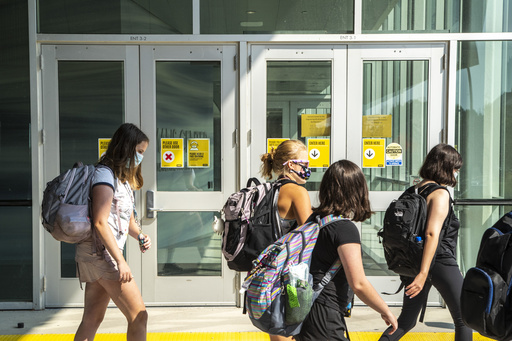DES MOINES, Iowa (AP) — A federal court on Tuesday dismissed a legal challenge to Iowa Gov. Kim Reynolds’ policy prohibiting schools from instituting mask requirements, which was brought by families of students with disabilities during the height of the COVID-19 pandemic.
The ruling marks the conclusion of the yearslong court battle, originating in the fall of 2021 with a lawsuit alleging that Reynolds violated federal disability law by preventing schools from adopting mask mandates as an accommodation for students with disabilities.
Reynolds celebrated the result, saying in a statement that Iowa focused on keeping kids in the classroom, “trusting parents to decide what was best for their children.”
“While children were the least vulnerable, they paid the highest price for COVID lockdowns and mandates, but Iowa was a different story,” she said.
The American Civil Liberties Union of Iowa and Disability Rights Iowa, among others, filed the lawsuit on behalf of The Arc of Iowa, a disability advocacy organization, and Iowa families, citing the heightened risk to students with disabilities.
Rita Bettis Austen, ACLU of Iowa’s legal director, said in a statement they were disappointed by the ruling but “proud of what this case was able to accomplish for vulnerable children in Iowa,” saying the case provided “early relief for our clients.”
The law was partially blocked for schools with students with disabilities for most of the 2021-2022 school year.
“Masking was critical to protecting the ability of children with underlying conditions and disabilities to attend school in person,” she said in an email. “Even in dismissing the case, the Court confirmed that Iowa law ‘does not prohibit a school from complying with disability laws.’”
A federal judge ruled in November 2022 that a school must consider, like any other accommodation request, a disabled students’ request that teachers, aides, students or others interacting with them wear a mask. The judge also said that a mandate must be allowed if that school district, considering Reynolds’ ban on mask mandates among other factors, determines it the request is a reasonable modification to make.
Reynolds appealed, and the federal court’s ruling orders dismissal, saying those who brought the lawsuit didn’t have standing to sue the state over the law. While COVID-19 remains an “ever-present concern in society,” the court said, the general risks “are not enough to show ‘imminent and substantial’ harm for standing” since they are speculative.
The court also dismissed the claims saying they did not clearly establish a connection between Reynolds’ action – the law or its enforcement – and the alleged injury of enduring COVID-19 and its risks.
This website uses cookies so that we can provide you with the best user experience possible. Cookie information is stored in your browser and performs functions such as recognising you when you return to our website and helping our team to understand which sections of the website you find most interesting and useful.
